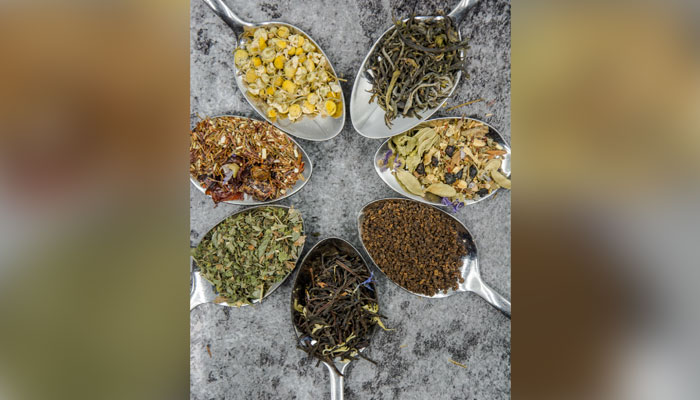Herbs lower sugar, fat and improve health during Ramazan
During Ramazan, salt, sugar and fat are consumed excessively. The salt added during cooking should be sufficient for your body; however, we consume many salty side dishes, such as deep-fried foods, olives, pickles, sauces, and cheeses. Reduce salty foods during Ramazan to avoid getting too thirsty during the day.
Excessive salt, sugars, and fat leads to cardiovascular disease, chronic inflammation, gut imbalance, bloating and strong cravings. A healthy diet is essential for those who wish to continue benefiting from the blessing of the Ramazan fasts, as getting sick means that you can no longer fast. Sensible cooking strategies can help you enjoy your food without wrecking your health.
Reduce unhealthy foods containing extra salt, sugar, or fat by improving food flavor with herbs and spices. Adding fresh herbs and spices to your meals can help you heal by reducing inflammation and reducing sugar cravings by better balancing blood sugar. Both offer a variety of health benefits without adding extra calories, salt, sugar, or fat.
Salt affects how we perceive bitterness and sweetness. Studies reveal that spicy flavors enhance a dish’s saltiness and sweetness. If you reduce the salt and sweet in a recipe and increase its flavor, the dish may still taste salty or sweet enough for you.
Sweet foods will vary in levels of fat and sugar, but they tend to be high in calories. Certain spices increase the intensity of the sweetness in food such as vanilla, cinnamon, clove, cardamom, and saffron. Salt alternatives to increase the intensity of salty feeling include black pepper, red pepper, green capsicum pepper, oregano, basil, soy, sage, bay leaves, curry patta (leaves).
After breaking fast, it is common for people feel bloated. Using certain herbs and spices helps digestion. Common spices include ginger, cumin, turmeric, ‘ajwain’ or carom seeds, fennel seeds (aniseed), and peppermint.
Adding vinegar, garlic, onion, ginger, and lemon can further improve the flavor. Fresh vegetables can be included in your diet with homemade dips and sauces – please ensure that you keep the salt low in these dips.
Reduce dietary fat by choosing lower-fat or reduced-fat dairy products or dairy alternatives. Grill, bake, poach or steam food rather than frying or roasting (both of which require oil). Measure oil with a teaspoon to control the amount you use; or use an oil spray sparingly.
Simply spicing up your diet can help you consume less salt, sugar and fat.“March Nutrition Month” is celebrated around the globe every year. Since 2008, Pakistan Nutrition and Dietetic Society (PNDS) has celebrated this month via many inclusive activities. This year’s theme is “Beyond the Table” which encourages everyone to adopt healthy eating and physical activity plans to achieve and maintain a healthy weight, reduce the risk of chronic disease and promote overall health. Why not benefit from some of these in this month as Ramazan dietary practices will be a common theme in many of these activities? Dr. Rezzan Khan, consultant nutritionist, Shifa International Hospital, Islamabad.
-
 Breaking: 2 Dead Several Injured In South Carolina State University Shooting
Breaking: 2 Dead Several Injured In South Carolina State University Shooting -
 China Debuts World’s First AI-powered Earth Observation Satellite For Smart Cities
China Debuts World’s First AI-powered Earth Observation Satellite For Smart Cities -
 Royal Family Desperate To Push Andrew As Far Away As Possible: Expert
Royal Family Desperate To Push Andrew As Far Away As Possible: Expert -
 Cruz Beckham Releases New Romantic Track 'For Your Love'
Cruz Beckham Releases New Romantic Track 'For Your Love' -
 5 Celebrities You Didn't Know Have Experienced Depression
5 Celebrities You Didn't Know Have Experienced Depression -
 Trump Considers Scaling Back Trade Levies On Steel, Aluminium In Response To Rising Costs
Trump Considers Scaling Back Trade Levies On Steel, Aluminium In Response To Rising Costs -
 Claude AI Shutdown Simulation Sparks Fresh AI Safety Concerns
Claude AI Shutdown Simulation Sparks Fresh AI Safety Concerns -
 King Charles Vows Not To Let Andrew Scandal Overshadow His Special Project
King Charles Vows Not To Let Andrew Scandal Overshadow His Special Project -
 Spotify Says Its Best Engineers No Longer Write Code As AI Takes Over
Spotify Says Its Best Engineers No Longer Write Code As AI Takes Over -
 Michelle Yeoh Addresses 'Wicked For Good' Snub At 2026 Oscars
Michelle Yeoh Addresses 'Wicked For Good' Snub At 2026 Oscars -
 Trump Revokes Legal Basis For US Climate Regulation, Curb Vehicle Emission Standards
Trump Revokes Legal Basis For US Climate Regulation, Curb Vehicle Emission Standards -
 DOJ Blocks Trump Administration From Cutting $600M In Public Health Funds
DOJ Blocks Trump Administration From Cutting $600M In Public Health Funds -
 2026 Winter Olympics Men Figure Skating: Malinin Eyes Quadruple Axel, After Banned Backflip
2026 Winter Olympics Men Figure Skating: Malinin Eyes Quadruple Axel, After Banned Backflip -
 Meghan Markle Rallies Behind Brooklyn Beckham Amid Explosive Family Drama
Meghan Markle Rallies Behind Brooklyn Beckham Amid Explosive Family Drama -
 Scientists Find Strange Solar System That Breaks Planet Formation Rules
Scientists Find Strange Solar System That Breaks Planet Formation Rules -
 Backstreet Boys Voice Desire To Headline 2027's Super Bowl Halftime Show
Backstreet Boys Voice Desire To Headline 2027's Super Bowl Halftime Show




